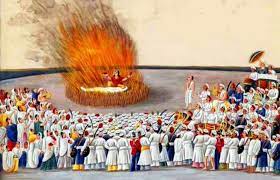Q. Did 19th Century Socio-religious reform movements address unethical social practices against women and children?
Ans: Yes, many 19th-century socio-religious reform movements in India did address unethical social practices against women and children. These movements emerged as responses to the prevalent social inequalities, discrimination, and harmful practices that affected various segments of society, including women and children. While the extent and focus of their efforts varied, these reform movements played a significant role in advocating for the rights and welfare of women and children.

Some of the notable reform movements that addressed these issues include:
- Raja Ram Mohan Roy and Brahmo Samaj: Raja Ram Mohan Roy, a pioneering social reformer, criticized practices such as sati (widow burning), child marriage, and female infanticide. He advocated for the empowerment of women through education and social awareness. The Brahmo Samaj, founded by Roy, campaigned against these practices and promoted women’s education and equality.
- Ishwar Chandra Vidyasagar and Widow Remarriage: Ishwar Chandra Vidyasagar was a strong advocate for widow remarriage and fought against the prevailing social taboo that prevented widows from remarrying. His efforts led to significant legal reforms that allowed widow remarriage and worked towards improving the status of widows in society.
- Dayananda Saraswati and Arya Samaj: Dayananda Saraswati and the Arya Samaj opposed child marriage, polygamy, and other regressive practices. They emphasized the importance of women’s education and equal participation in social and religious activities.
- Pandita Ramabai and Mukti Mission: Pandita Ramabai was a champion of women’s rights and worked tirelessly to uplift widows and provide them with education and support. She established the Mukti Mission to address the challenges faced by widows and other marginalized women.
- Jyotirao Phule and Satyashodhak Samaj: Jyotirao Phule was a social reformer who challenged caste-based discrimination and advocated for women’s education. He founded the Satyashodhak Samaj, which aimed to uplift marginalized communities and improve the status of women.
- Swami Vivekananda and Ramakrishna Mission: Swami Vivekananda emphasized the importance of women’s education and empowerment. The Ramakrishna Mission, established by his disciples, has been involved in various social and educational initiatives for the betterment of women and children.
- Social Legislation: The efforts of these reform movements contributed to significant legal reforms aimed at addressing unethical practices against women and children. Reforms included the Age of Consent Act, which sought to curb child marriages, and the Sati Regulation Act, which prohibited the practice of sati.
While these reform movements made significant strides in challenging unethical social practices against women and children, it’s important to note that the impact was not uniform across all segments of society. Change was gradual and often met with resistance from conservative elements. Nonetheless, these reformers laid the foundation for subsequent social and legal changes that continue to shape the rights and status of women and children in India today.
Thanks for reading the answer to question: Did 19th Century Socio-religious reform movements address unethical social practices against women and children?